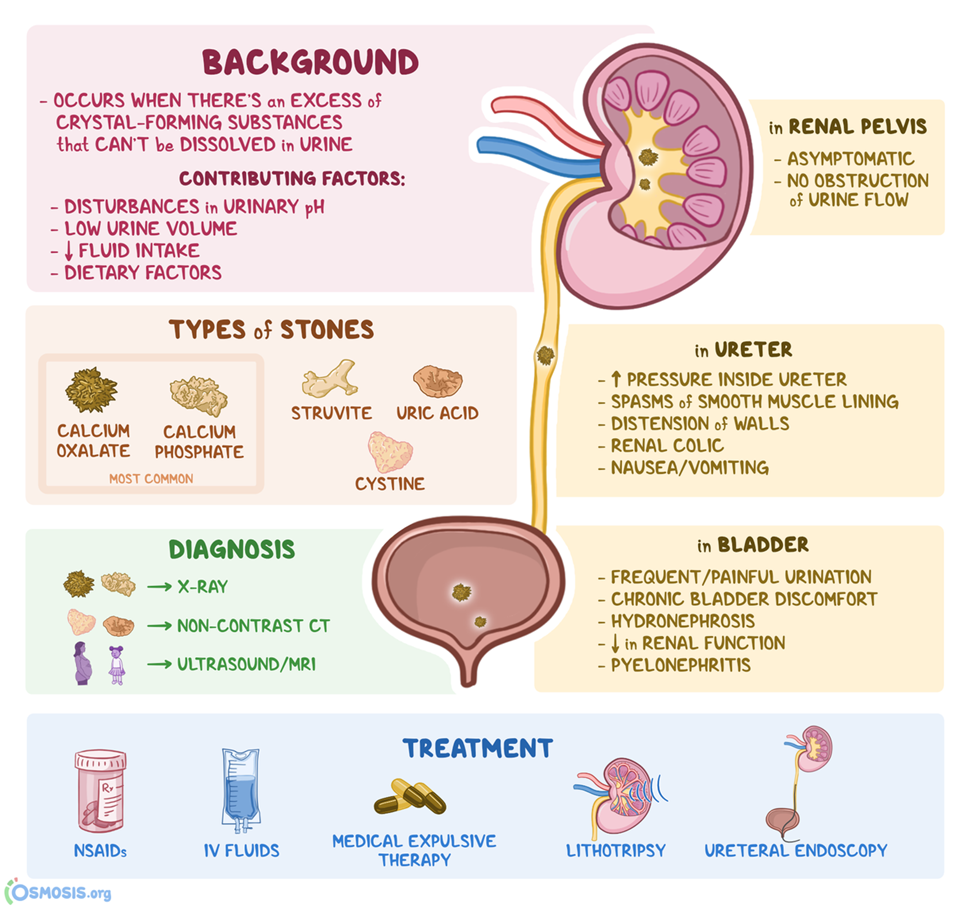A client with hyperparathyroidism reports a sudden onset of severe flank pain. Which intervention should the nurse include in the client's plan of care?
Initiate cardiac telemetry.
Administer a PRN dose of a laxative.
Implement seizure precautions
Begin straining all urine
The Correct Answer is D
A. Initiate cardiac telemetry:
Cardiac telemetry is not the immediate priority in this case. Kidney stones are more likely to cause severe localized pain rather than cardiac-related symptoms.
B. Administer a PRN dose of a laxative:
Laxatives are not indicated for the management of kidney stones or the associated flank pain. The priority is to address the specific needs related to the possible passage of kidney stones.
C. Implement seizure precautions:
Seizure precautions are not relevant to the sudden onset of severe flank pain in the context of hyperparathyroidism. The focus should be on managing pain, assessing for kidney stone passage, and addressing the underlying cause.
D. Begin straining all urine.
Straining all urine allows for the collection and examination of any passed stones. This information is important for identifying the composition of the stones and guiding further management.

Nursing Test Bank
Naxlex Comprehensive Predictor Exams
Related Questions
Correct Answer is C
Explanation
A. Facial puffiness and periorbital edema:
These are common signs of hypothyroidism but may not require immediate action unless accompanied by severe symptoms.
B. Cold and dry skin:
Cold and dry skin is a characteristic feature of hypothyroidism, but a further decline in the level of consciousness is a more urgent issue.
C. Further decline in the level of consciousness.
A decline in the level of consciousness is a critical sign that requires immediate attention, as it may indicate worsening hypothyroidism, myxedema coma, or other serious complications. Myxedema coma is a life-threatening condition associated with severe hypothyroidism, and it requires prompt medical intervention.
D. Hematocrit of 30% (0.30):
While anemia is a potential complication of hypothyroidism, a hematocrit of 30% alone may not be the most immediate concern compared to a decline in the level of consciousness.
Correct Answer is D
Explanation
A. Administer a topical analgesic:
Administering a topical analgesic can help alleviate pain and discomfort associated with oral thrush. However, it addresses the symptom rather than the cause of the issue.
B. Cleanse the mouth with swabs:
Cleansing the mouth with swabs can be part of the care plan for managing oral thrush. It helps remove debris and may reduce the fungal load in the mouth.
C. Obtain a soft diet for the client:
Providing a soft diet is important for clients with oral thrush as it minimizes irritation to the affected area. However, it may not be the first intervention; rather, it is part of the overall care plan.
D. Encourage frequent mouth care:
Encouraging the client to perform frequent mouth care is the most immediate and direct intervention. This includes gentle rinsing with a mild solution, which can help relieve symptoms and prevent the spread of the infection.
Whether you are a student looking to ace your exams or a practicing nurse seeking to enhance your expertise , our nursing education contents will empower you with the confidence and competence to make a difference in the lives of patients and become a respected leader in the healthcare field.
Visit Naxlex, invest in your future and unlock endless possibilities with our unparalleled nursing education contents today
Report Wrong Answer on the Current Question
Do you disagree with the answer? If yes, what is your expected answer? Explain.
Kindly be descriptive with the issue you are facing.
